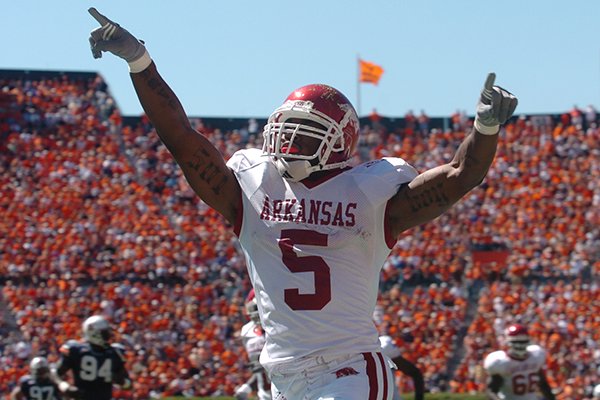Turning through the pages of the Athlon Sports football preview, a $9.99 investment, it was both interesting to read and difficult to argue with the magazine's best 50 college football players since the magazine began in 1967.
Although it was missing one player: Darren McFadden.
In three college seasons, two of which he was runner-up for the Heisman Trophy, McFadden rushed for 4,590 yards, caught 46 passes for 365 yards, passed for 205 yards and returned kicks for 926 yards. That's a grand total of 6,086 all-purpose yards.
The magazine selected Georgia Bulldog Herschel Walker as its No. 1 player. Walker (5,259 yards) is the only SEC running back to run for more yards than McFadden, but he had 209 more carries. Walker averaged 5.3 yards per carry, while McFadden averaged 5.8.
Walker deservedly won the Heisman in 1982, but it still seems like McFadden lost a popularity contest during his first Heisman bid, in 2007, to Tim Tebow, the Florida quarterback who somehow was listed as the No. 6 best player. He was the top quarterback.
The first five slots went to running backs, and it is impossible to argue that No. 2 Barry Sanders, No. 3 Archie Griffin, No. 4 Earl Campbell and No. 5 Bo Jackson don't belong on the list.
Griffin rushed for more yards -- 5,589 in four years -- than McFadden. The remaining three did not.
That's not to say McFadden was better, but he should be mentioned in the same breath and on the same list of great players.
The panel of 16 obviously had some subjective voting, otherwise Tebow wouldn't have been No. 6 and Vince Young No. 8 while Cam Newton came in 30th. Newton may have played only one year, but to not list him as your top quarterback seems a bit of a stretch. He won a Heisman and a national championship in that one season.
Tommie Frazier was the third quarterback listed, at No. 12.
John Elway doesn't get on the list until No. 33. Were Tebow and Young better than Elway? Not in any form of the game.
Archie Manning made the list at No. 36, andhis son, Peyton, somehow came in at only No. 45. The younger Manning wasn't just good in the NFL, he was great in college, too.
Those are subjective, just as it is that Keith Jackson should have been listed higher than No. 46, and understand he was the only native Arkansan to make the list.
Jackson redefined the position of tight end while at Oklahoma. On a team that would make Danny Ford look like he loved passing plays, Jackson caught 65 passes for 1,561 yards for an average of 24 yards per catch. He was big, fast and had great hands. The Sooners went 42-5-1 in his career and won the national championship.
He was the only tight end to make the list, but if you are the best and only one at your position, shouldn't you at least be in the top 25?
The top defensive player listed was Pittsburgh defensive end Hugh Green at No. 7, then came Deion Sanders at No. 9, Charles Woodson at No. 11, Lee Roy Selmon at No. 13, Ndamukong Suh at No. 15, Ronnie Lott at No. 18, Derrick Thomas at No. 21, Kenny Easley at No. 25, Lawrence Taylor at No. 28, Jack Tatum at No. 29, Steve Emtman at No. 31, Brian Bosworth at No. 32, Ed Reed at No. 34, Mike Singletary at No. 39, Randy White at No. 40 and Bruce Smith at No. 41.
Yet one of the all-time greats, Reggie White -- the defensive tackle nicknamed "The Minister of Defense" -- was No. 43.
All of those players were outstanding, but none were better or more dominating than White.
Overall, it was an interesting list and maybe not as hard to argue with as originally thought, and a case could be made for each being deserving, just like Darren McFadden.
Sports on 06/25/2017

